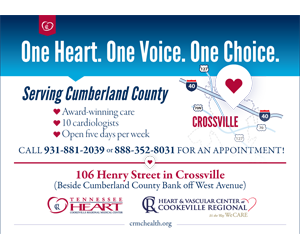Famous author Patricia Neal Lanza grew up in Crossville, spent
the rest of her life traveling around the country, but now she’s home.
By Don Napier
The story you are about to read is true. The names have not been changed to protect the innocent. It’s a real American short story, told to me by a lady I just met a few weeks ago, a lady who has moved back to her home county.
Patricia Neal Lanza is known worldwide as the author of “Lasagna Gardening,” a series of books about layered gardening. She was born in Crossville and learned to garden at her grandmother’s side. Year’s later, the seeds sown in her childhood blossomed as she created her first “Lasagna” garden. In “Lasagna Gardening,” Pat describes that first layered garden and the more than 30 that followed it. Through her story, she shares the lessons she’s learned in her nearly 50 years of gardening experience.
This is the first of a two part story. This first installment is about Pat’s earlier life prior to becoming an author.
Her mother’s people (Webb & Wyatt) came from Virginia and settled in Hale’s Chapel. They were farmers and loggers. Her father’s people (Neal & Alexander) came up to Crossville from Monterey. Both sides of the family were of Irish and Scottish decent. The Neals were coal miners and Thomas Neal worked the shallow mines that abounded in this area of Tennessee. They were all, according to Patricia, hard working, tobacco-smoking and chewing, whiskey-drinking, snuff-dipping folks. Her mother and father was Mamie Webb Neal and George Neal.
“My grandmothers, Della Webb and Etta Neal, were my role models,” Pat said. “Even though I was the only child born to either family for eight years, they did the best they could to take care of me while they continued with their work.” She sat on a tall stool in the kitchen watching them cook or tagged along as they gardened. “Observation and endless questions were my best learning tools,” she said.
“Mother’s mother,” Pat said, “was Della Wyatt Webb, who married a brute of a man (Orda Webb) and when she had enough of his pure meanness, she packed up her four babies and moved from Lake Mary, Florida back to Crossville.”
She rented one of the little houses behind the courthouse and took in washing and ironing. Her oldest child (Cob Webb) at age seven was her delivery boy, pulling his wagon around town to pick up and deliver dirty and clean clothes.
“Della worked hard, saved her money and rented a small house on Stanley Street where she could have a garden,” Pat said. “She would rent a mule for half a day to help her plow, but everything else was done with a hoe. She even share-cropped for her neighbors down the street. Later, she bought that house and it was where I was born in 1935. Dr. Dooley came to the house to deliver me.”
About the same time Della was living behind the courthouse, Etta and Thomas Neal married and began their family in Monterey. He was working in a mine and had saved enough to buy a boarding house for Etta to run. They worked two jobs for many years, while having six boys, two who died in infancy. When Thomas bought the mine, he moved his family to a farm on the Sparta Highway, on the outskirts of Crossville.
Learning from grandmother
“I spent lots of time at this farm,” Pat said, “running around behind my grandmother as she tended to the house, chickens, pigs and a really big garden.” Etta ran the farm until Thomas was ready to retire from mining. He came into town, bought a house and large lot on Thurman Ave. and a small place on Main Street, Neal’s Cafe.
His plan was for her to run the kitchen and he would tend bar. “It worked until Uncle Cob backed up over him in front of the post office,” Pat said, “breaking his leg. Everyone went to the post office back then and Uncle Cob drove while my grandfather walked. It was an accident that made my grandfather sell Neal’s Café. It became the Broadway Café with this sale.”
“When I was about four years old,” Pat said, “I was sitting in the kitchen of Neal’s Café, watching my grandmother cook, when shots rang out. We were all frozen in place for a few seconds. We watched as a man ran through the kitchen headed for the back door. Behind him was the shooter, firing wildly trying to kill the running man. He did just that when the man made it to the back door. He was dead, laid out across the back steps.”
“The shooter just kept running and jumped over the body to get away. It was all over quickly and when the shooting stopped, my grandmother’s helper fell down with a gunshot to her leg. Some men took her across the street to Dr. Lawson’s. My grandmother threw a pan of water on the bloody steps and everything just went on as if nothing had happened, except there was lots to talk about. I was just a child, but I know it must have been a terrible time for the families involved.”
Crossville was Pat’s playground. She spent most of her time running from one of the businesses her people owned to the interesting places in town. “Uncle Cob had a gas station on Route 70,” Pat said, “across from Highland Motors. Neal’s Café was next door to Hale’s Grocery, Mamie worked at the bus station and at the POW Camp.”
Mamie, her mother, and her father went to work in Detroit. “While they were there, they would sometimes drive home on weekends to see me,” Pat said. “On one of those trips, they decided to take me back to Detroit with them. They didn’t foresee the difficulties of having a small child and being able to work, not to mention I got in the way of their social life.” It wasn’t long before they decided to send her back. “I remember my mother packing my little cardboard suitcase and my father putting a tag on a long string around my neck that read: Send to: Mr. Thomas Neal, Crossville, Tennessee. I also remember him giving the bus driver some money and asking him to look after me on the trip.”
The trip home
“The bus stopped a lot to pick up or let off other travelers and once I changed buses. I learned to use the restrooms and buy soda and peanuts for my meals,” Pat said. “We got to Crossville at 3:00 a.m. and I knew to get the taxi to take me to the Neal’s house on Thurman Ave. The driver pounded on the kitchen door until my grandfather got up to let me in. My grandfather just told me to go to bed and he would see me in the morning.”
“Crossville was a wonderful place to grow up,” Pat said. “Hills Department Store, Mitchell’s Drugs, Ben Franklin Five and Ten Cent Store, Hale’s Grocery, Mayberry Furniture, sidewalks to run and skip on, a shoe shop where I got taps on my shoes and the little park across from the bus station.
“I felt safe and surrounded by people I knew because of my people being in business. Everyone knew who I was and who my people were. I learned to swim at the State Park, learned to ride a bicycle on Stanley Street, learned to sing listening to the juke box at Neal’s Café, and learned to sew by taking home economics at Cumberland County High School,” she said.
“Uncle Cob went on to build the Starlight Drive-In Theater and Mama Webb sold her house on Stanley Street to build a little house at the drive-in exit. She ran the concession stand at the drive-in, selling sloppy joes, popcorn, soda and candy bars.
“Mamie built that first café (Mamie’s 2 by 4) then went on to run the Black & White Café, Cumberland Grill, next door to the Palace Theater, The B&M Café on Route 70, and a road house between counties with no name. Food service was a part of my childhood, as I had memories of five-cent hamburgers and carhopping, washing dishes or sweeping floors, taking cash for tickets, pouring beer into milkshake cups for Sunday dances and breading oysters for platters.”
“All my experiences as a child in Crossville prepared me for life” Pat said. “I attended Crossvile Elementary, Cumberland County High School and the school of hard knocks.”
Pat and her family relocated to Jacksonville, Florida during her high school years. She left behind her friends and family to follow her mother, who got a job in insurance and they lived in a nice neighborhood while she went to high school. She met the boy next door and got married. “We started a family and life began,” she said, “as it should.”
After she got married, Pat attended Jones Business College in Jacksonville and worked in offices, bars and department stores, for a laundry business and had seven children. “We ended up in New Jersey, moving to the New York Catskills, where we became innkeepers.,” Pat said.
“All the life experiences I had in Crossville, Tennessee would help to us become successful innkeepers,” She said. “My family and I ran the inn like a large home – we rented rooms, cleaned and did laundry, and served food and beverages using recipes from our families.”
“Some of our seven children were on their own when we bought the inn,” she said, ” but most worked at the inn to put themselves through college. Some used the inn as a grounding tool to push off from to get to their own lives started. Eventually they were all gone and my husband and I were alone.”








